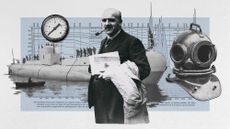The GOP's three-wing circus: Can any candidate unite them all?
There are a lot of Republicans running for president. But only a few have a shot of uniting their party.


Trying to understand the dynamics of the 2016 Republican presidential race is like trying to watch a three-ring circus: There's too much going on to absorb all at once.
The circus analogy may be overused, but thinking of the party in terms of three rings — or to be more precise, wings — can be very useful.
Ronald Reagan was the first candidate to unite the three wings of the modern Republican Party: Christian conservatives, national security hawks, and the Wall Street establishment. His coalition dominated national politics in the 1980s and every GOP nominee since has tried to copy that same electoral formula.
Subscribe to The Week
Escape your echo chamber. Get the facts behind the news, plus analysis from multiple perspectives.

Sign up for The Week's Free Newsletters
From our morning news briefing to a weekly Good News Newsletter, get the best of The Week delivered directly to your inbox.
From our morning news briefing to a weekly Good News Newsletter, get the best of The Week delivered directly to your inbox.
George H.W. Bush always had the establishment and foreign policy credentials but was never fully trusted by evangelical Christians. Being Reagan's vice president helped him win the 1988 election, but he lost his re-election bid in 1992.
His born-again son, George W. Bush, did a better job with the religious right and used his family ties to bolster his reputation with the other two wings. But bungling wars in Iraq and Afghanistan and blowing up the national debt later hurt him. In fact, many think the second Bush broke the Reagan coalition beyond repair. No one has been able to put it back together since.
In 2008, John McCain had the national security credentials, but his maverick reputation hurt him with the GOP establishment and evangelicals never trusted him. In 2012, Mitt Romney had the backing of Wall Street but his Mormonism created a rigid barrier with the religious right and he had no foreign policy experience. Neither man was ever able to pull his party together in a convincing way.
The Republican candidate who performs best with each of these three wings — and unites them — has the best chance of prevailing in the 2016 general election. Looking at the GOP presidential race through this lens brings a clearer view of who might be the best candidate to nominate.
Most of the Republicans running are just one-wing candidates and a few can claim support from two.
In fact, there may be only three candidates with the ability to unite the three wings and rebuild the Reagan coalition. Gov. Scott Walker of Wisconsin and Sen. Marco Rubio of Florida top the list, but both have their weaknesses. Walker has no national security experience and performed poorly on a recent overseas trip. Rubio is young and still unknown to much of the GOP establishment.
Jeb Bush is the third top-tier candidate, but his family's connections are both a strength and a curse. He may have the support of some foreign policy big wigs, but he's also saddled with his brother's foreign policy disasters.
The Republican candidate that can unite these three wings has the best chance to prevail against the Democratic candidate in the general election. It's still too early to say who might be able to do it — but we can at least conclude that only three candidates out of the GOP primary circus have a real shot.
Create an account with the same email registered to your subscription to unlock access.
Sign up for Today's Best Articles in your inbox
A free daily email with the biggest news stories of the day – and the best features from TheWeek.com
Taegan D. Goddard is the founder of Political Wire, one of the earliest and most influential political websites. He also runs Wonk Wire and the Political Dictionary. Goddard spent more than a decade as managing director and COO of a prominent investment firm in New York City. Previously, he was a policy adviser to a U.S. senator and governor. Goddard is also co-author of You Won — Now What? (Scribner, 1998), a political management book hailed by prominent journalists and politicians from both parties. Goddard's essays on politics and public policy have appeared in dozens of newspapers across the country, including The Washington Post, USA Today, Boston Globe, San Francisco Chronicle, Chicago Tribune, Philadelphia Inquirer, and Christian Science Monitor. Goddard earned degrees from Vassar College and Harvard University. He lives in New York with his wife and three sons.
-
 The World War Two experiments that made D-Day possible
The World War Two experiments that made D-Day possibleUnder The Radar Scientists performed gruelling tests on themselves paving the way for the iconic invasion
By Chas Newkey-Burden, The Week UK Published
-
 Is the Supreme Court about to criminalize homelessness?
Is the Supreme Court about to criminalize homelessness?Talking Points The court will decide if bans on outdoor camping are 'cruel and unusual'
By Joel Mathis, The Week US Published
-
 Fall into the groove at these delightful record stores
Fall into the groove at these delightful record storesThe Week Recommends Each one strikes its own chord
By Catherine Garcia, The Week US Published
-
 Arizona court reinstates 1864 abortion ban
Arizona court reinstates 1864 abortion banSpeed Read The law makes all abortions illegal in the state except to save the mother's life
By Rafi Schwartz, The Week US Published
-
 Trump, billions richer, is selling Bibles
Trump, billions richer, is selling BiblesSpeed Read The former president is hawking a $60 "God Bless the USA Bible"
By Peter Weber, The Week US Published
-
 The debate about Biden's age and mental fitness
The debate about Biden's age and mental fitnessIn Depth Some critics argue Biden is too old to run again. Does the argument have merit?
By Grayson Quay Published
-
 How would a second Trump presidency affect Britain?
How would a second Trump presidency affect Britain?Today's Big Question Re-election of Republican frontrunner could threaten UK security, warns former head of secret service
By Harriet Marsden, The Week UK Published
-
 'Rwanda plan is less a deterrent and more a bluff'
'Rwanda plan is less a deterrent and more a bluff'Instant Opinion Opinion, comment and editorials of the day
By The Week UK Published
-
 Henry Kissinger dies aged 100: a complicated legacy?
Henry Kissinger dies aged 100: a complicated legacy?Talking Point Top US diplomat and Nobel Peace Prize winner remembered as both foreign policy genius and war criminal
By Harriet Marsden, The Week UK Last updated
-
 Trump’s rhetoric: a shift to 'straight-up Nazi talk'
Trump’s rhetoric: a shift to 'straight-up Nazi talk'Why everyone's talking about Would-be president's sinister language is backed by an incendiary policy agenda, say commentators
By The Week UK Published
-
 More covfefe: is the world ready for a second Donald Trump presidency?
More covfefe: is the world ready for a second Donald Trump presidency?Today's Big Question Republican's re-election would be a 'nightmare' scenario for Europe, Ukraine and the West
By Sorcha Bradley, The Week UK Published